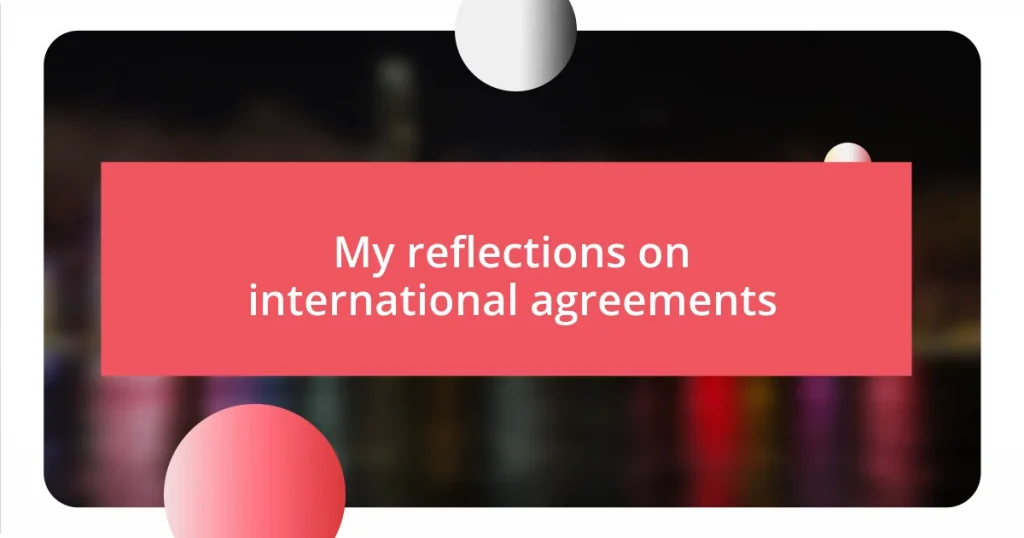Key takeaways:
- International agreements are crucial for global cooperation, promoting peace, regulating trade, addressing climate change, and encouraging cultural exchange.
- The negotiation process is complex, requiring clarity in the agreement’s components, balancing power dynamics, and addressing public opinion to reach effective solutions.
- Future agreements are likely to be shaped by technology, grassroots movements, and evolving demands for accountability, enhancing transparency and inclusivity in international diplomacy.
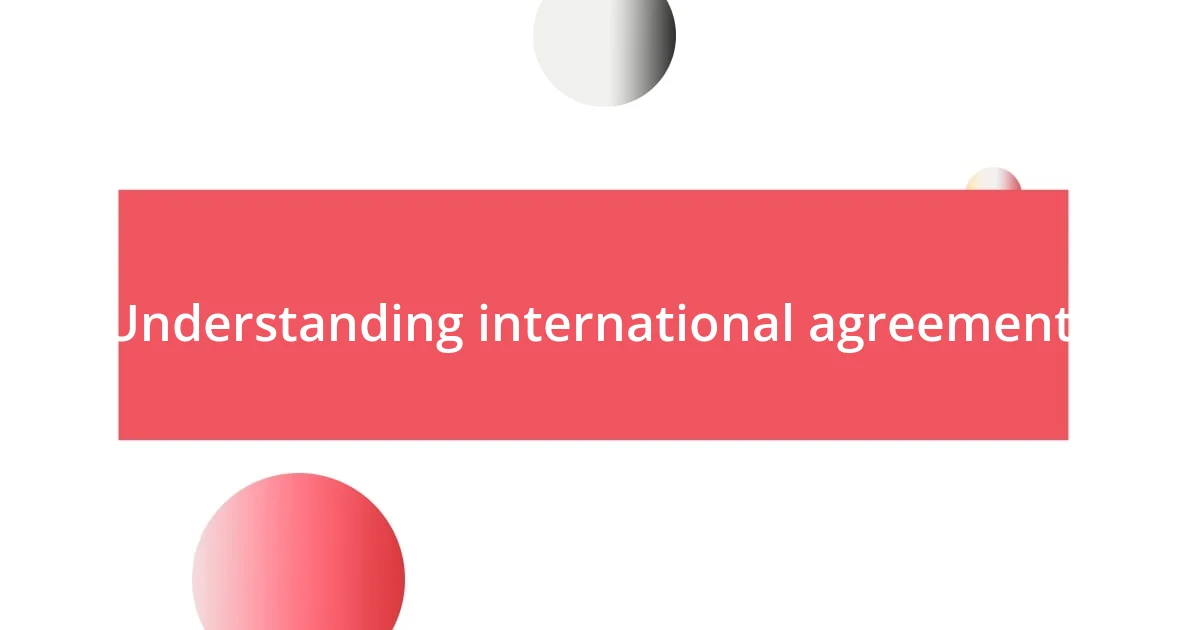
Understanding international agreements
When I first started diving into international agreements, I was struck by how they shape not only global politics but also everyday life. These documents, whether trade treaties or climate accords, serve as the rules of the road for nations interacting on the world stage. Have you ever stopped to think about how a simple product you love might be influenced by an agreement signed continents away?
Growing up, I remember hearing about the Kyoto Protocol in school. It seemed distant and abstract at the time, but I later realized it was crucial in the fight against climate change. It made me appreciate how interconnected our world is; decisions made in one country can affect the air we breathe and the temperatures we experience in another.
International agreements can sometimes feel like a maze, and I often wonder how negotiators navigate the complexities involved. I’ve had moments of frustration when understanding the intricate language used in these treaties, but there’s something fascinating about the diplomacy behind it. It’s in those conversations and compromises that I see the true essence of cooperation—and that gives me hope for our future.
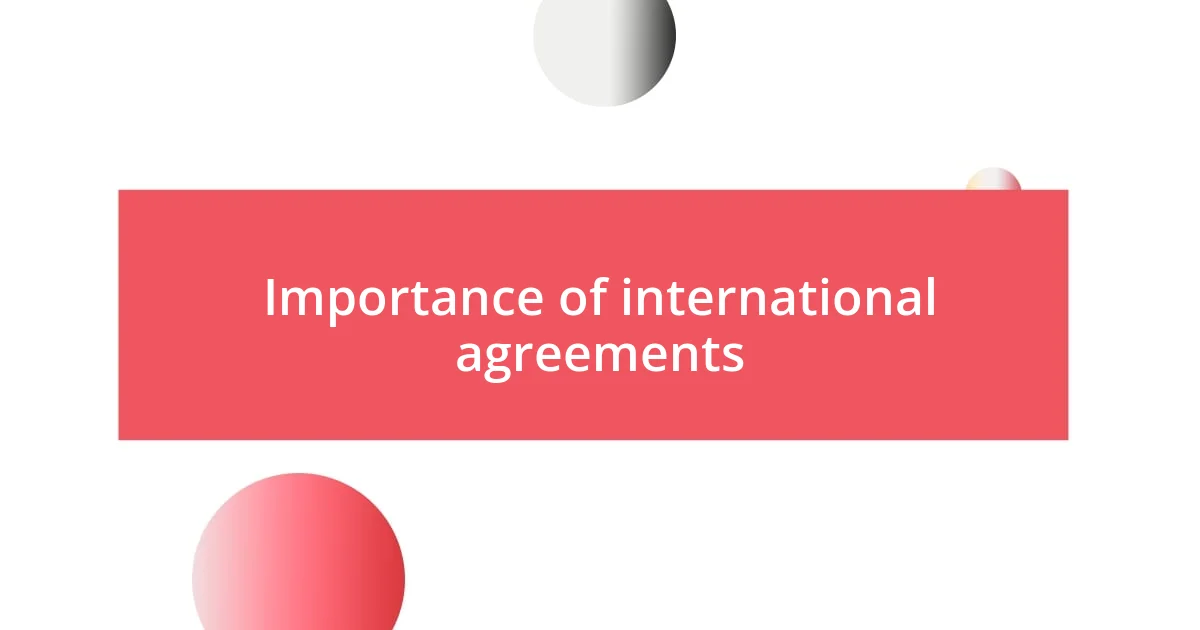
Importance of international agreements
The significance of international agreements cannot be overstated. They provide a framework for cooperation among nations, fostering peace and stability in a complex world. I can recall a moment during a university debate on global trade; it was eye-opening to realize how agreements can help create a level playing field, allowing countries to thrive economically while adhering to shared standards. That understanding ignited my passion for international relations.
Here are a few key points that highlight the importance of international agreements:
- Promote Peace: They help mitigate conflicts by providing diplomatic channels for dialogue and negotiation.
- Regulate Trade: Agreements establish fair trade practices, ensuring that economies can benefit from each other’s strengths.
- Address Global Issues: Collectively tackling challenges like climate change requires cooperation; agreements set common goals and accountability.
- Cultural Exchange: They encourage understanding and collaboration among nations, fostering goodwill and shared values.
Reflecting on these elements, it becomes clear that international agreements play a vital role in shaping a cooperative world. It’s fascinating how they impact our lives, often in ways that go unnoticed.
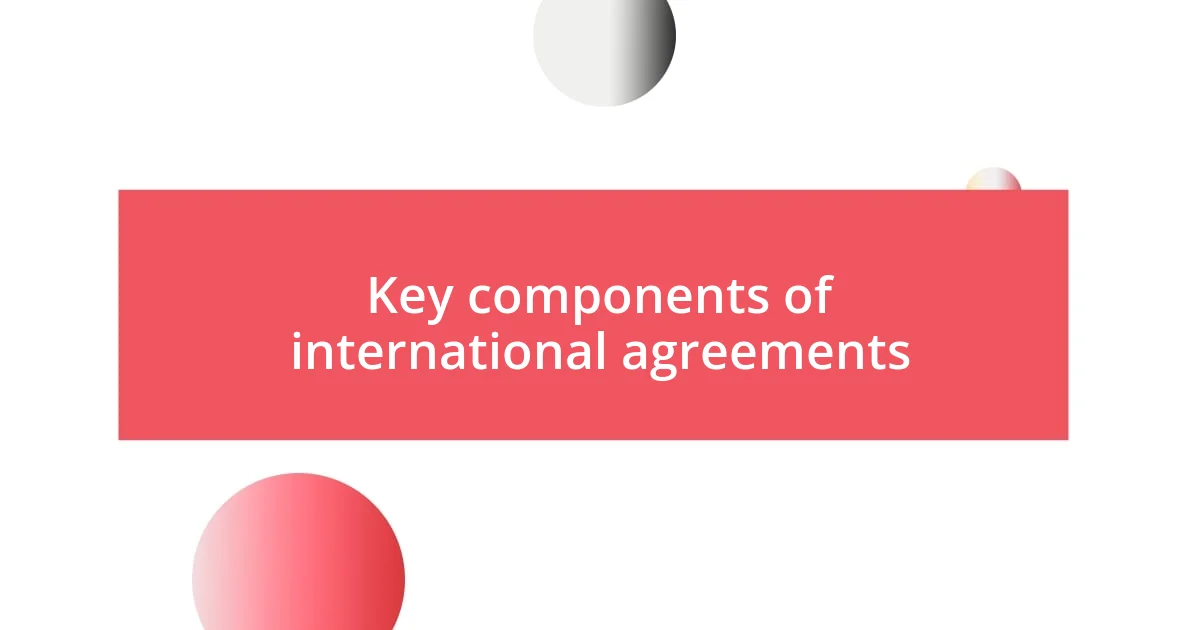
Key components of international agreements
When considering the key components of international agreements, I find the framework crucial. At its core, each agreement includes parties involved, the subject matter, terms and obligations, and mechanisms for enforcement or dispute resolution. I remember attending a workshop on international law, where I learned that the clarity of these components often determines the agreement’s success. If one party doesn’t understand their obligations, it can lead to conflicts down the road.
Another essential aspect lies in the negotiation process itself. I still recall the animated discussions I witnessed at a conference focused on environmental treaties. Stakeholders from various nations had to navigate differing priorities and cultural values, ultimately reaching a consensus. This process is about balancing interests and finding common ground—an endeavor that really emphasizes the art of diplomacy.
I’ve also seen the importance of periodic reviews and updates to agreements. A few years ago, I was intrigued by the Paris Agreement’s mechanisms for assessment every five years; this ensures that nations stay committed to evolving challenges. It made me reflect on how just like in our lives, sometimes we need to reassess our commitments and adjust our paths to reflect our current realities.
| Component | Description |
|---|---|
| Parties Involved | Identifies the nations or organizations that are entering into the agreement. |
| Subject Matter | Specifies the main issues addressed, such as trade, environment, or security. |
| Terms and Obligations | Outlines the responsibilities that each party agrees to fulfill. |
| Enforcement Mechanisms | Details how compliance will be monitored and what happens in case of disputes. |
| Review Procedures | Establishes how and when the agreement will be evaluated or amended. |
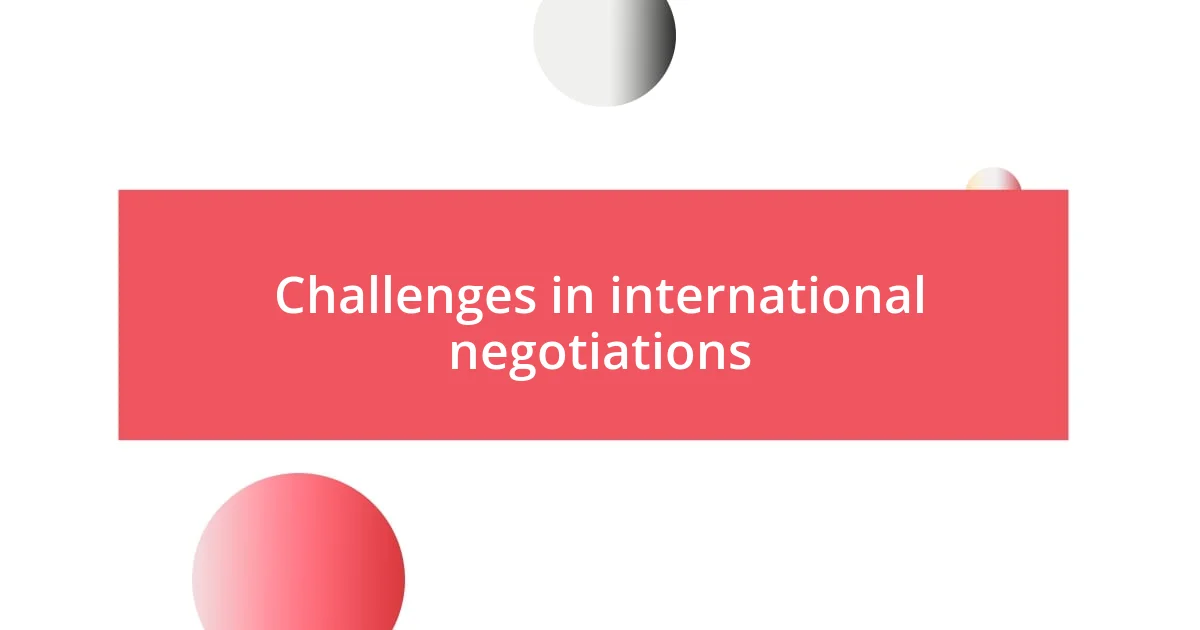
Challenges in international negotiations
Negotiating international agreements can feel like navigating a minefield at times. One vividly recalls the hours spent in negotiation simulations during my coursework, where misunderstandings often arose from cultural nuances. It really struck me how a simple phrasing could sway perceptions and lead to different interpretations—there’s always a risk that the intended message gets lost in translation.
Another challenge that often surfaces is the disparity in power dynamics among negotiating parties. I remember discussing the implications of this imbalance with peers at a seminar. It left me pondering: how can a smaller nation assert its interests when larger powers dominate the table? The struggle is real, and this inequality can create tension, making it harder to reach cooperative solutions.
Finally, there’s the ever-present issue of public opinion influencing negotiations. A few years back, I attended a public forum where citizens passionately voiced their concerns about a trade agreement. This experience made me realize how vital it is for negotiators to consider the voices of their people. If negotiators ignore domestic sentiments, they risk backlash that could derail even the most promising agreements. It brings to mind the question: can effective diplomacy ever be achieved without genuine public engagement?
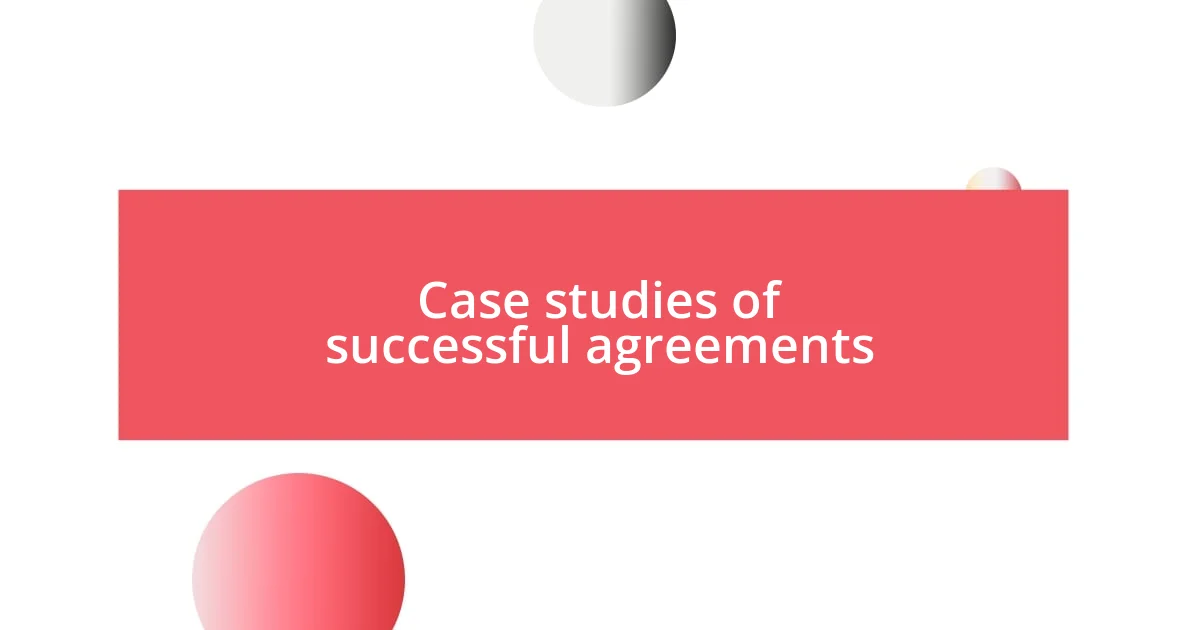
Case studies of successful agreements
Reflecting on successful international agreements, the Good Friday Agreement of 1998 stands out to me as a remarkable example of diplomacy in action. It’s fascinating how negotiators from the UK and Ireland crafted this landmark deal to resolve decades of conflict in Northern Ireland. I often think about how powerful it must have felt to witness those discussions, where diverse voices came together to foster peace, addressing deep-rooted issues of identity and governance.
Another case that resonates with my experiences is the Montreal Protocol on Substances that Deplete the Ozone Layer. When I read about its success in phasing out harmful chemicals, I was struck by the power of global cooperation. During a recent environmental sustainability course, the instructor emphasized that this agreement not only saved our atmosphere but also highlighted how collective action can yield real, measurable results. Could it be that when nations prioritize our shared future over individual interests, we unlock new possibilities for collaboration?
Lastly, the Joint Comprehensive Plan of Action (JCPOA) concerning Iran’s nuclear program is an intriguing case study, albeit with its controversy. What captured my attention was the intense negotiations that unfolded over years, revealing the complexities of balancing national security with diplomacy. I remember discussing this topic with colleagues, and we pondered: how can such sensitive issues pave the way for a more stable world? It seems to me that when trust is built, even the most challenging agreements might transform into pathways for lasting peace.
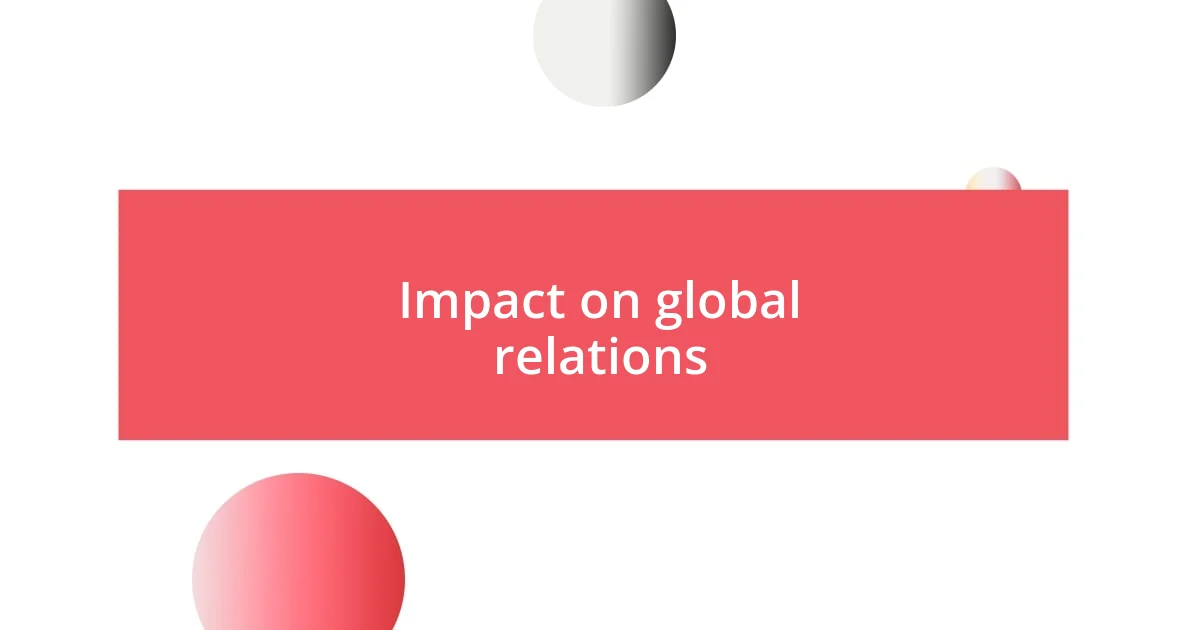
Impact on global relations
The impact of international agreements on global relations can be profound. I’ve often reflected on how these agreements serve as bridges between nations, fostering long-term partnerships. For instance, during my travels, I’ve witnessed the camaraderie that develops during joint initiatives, where countries come together to tackle common challenges like climate change. Doesn’t it feel inspiring when nations unite for a greater cause, reminding us that we share this planet together?
Moreover, these agreements can also shift power dynamics on the global stage. I remember a particularly engaging discussion with a group of friends about the Paris Agreement and how it has galvanized countries to commit to climate action. We marveled at how this collective effort has empowered smaller nations to voice their needs alongside larger ones, showcasing a remarkable evolution in international diplomacy. Isn’t it fascinating how collaboration can level the playing field?
However, there’s always the flip side to consider. Reflecting on my experience in attending various international forums, I’ve noticed that disagreements stemming from cultural and political diversity can create rifts. One such instance was at a roundtable where representatives debated trade regulations; the tension in the room was palpable. This made me realize that while agreements are essential, the journey to get there can test relationships and highlight underlying tensions. How do we navigate these complexities while maintaining a spirit of collaboration? That’s a question I continually grapple with.
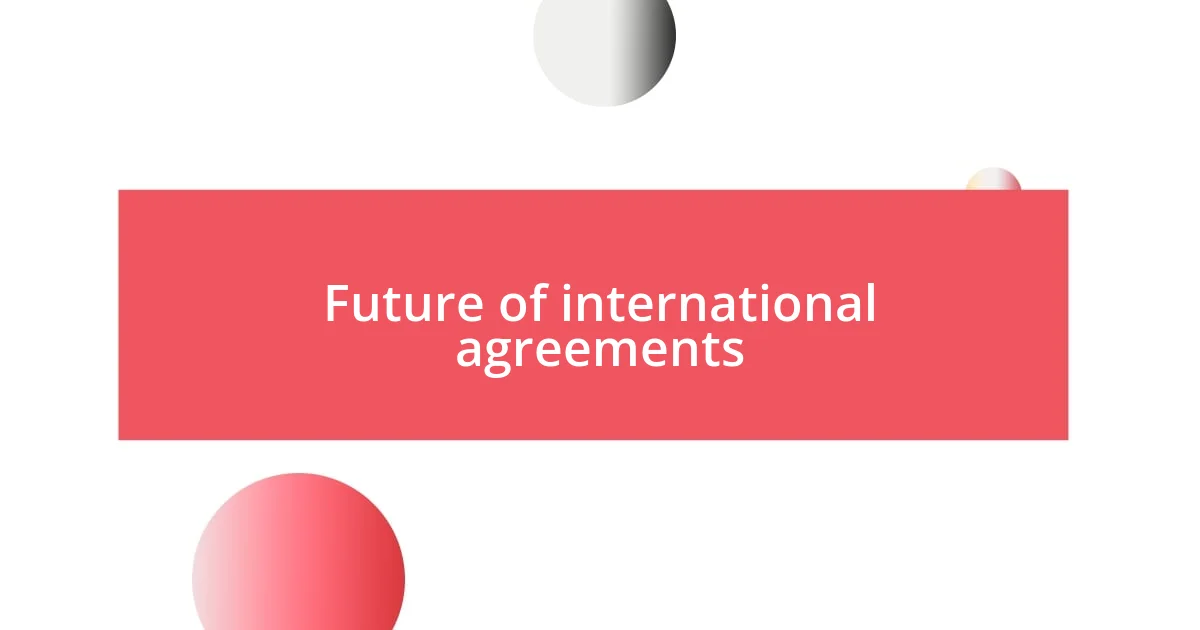
Future of international agreements
It’s intriguing to think about how the future of international agreements might evolve. I often find myself reflecting on the increasing role of technology. For instance, digital platforms have the potential to transform negotiations by enabling real-time communication. When I first experienced a virtual conference, I was amazed by how it broke down geographic barriers, allowing diverse perspectives to converge instantly. Isn’t it exciting to imagine how these advancements could create a new level of transparency and inclusivity?
I believe the growing urgency of global challenges will also shape these agreements moving forward. With climate change pressure mounting, I can picture nations uniting even more vigorously around sustainable development goals. Once, while volunteering for a local environmental group, I felt the palpable energy when communities rallied to propose green initiatives. It made me realize that grassroots movements can directly influence international dialogue. How powerful would it be if these local efforts inspire global agreements that truly reflect the collective will?
Additionally, I wonder about the evolving nature of accountability in international partnerships. As I’ve seen during various collaborative projects, the success of agreements often hinges on trust and mutual responsibility. I recall a time when my team faced challenges in upholding commitments, and it taught me how crucial transparency is in sustaining long-term relationships. Could it be that future agreements will require binding accountability measures, ensuring all parties remain committed to shared goals? It feels like an essential advancement for truly effective diplomacy.










